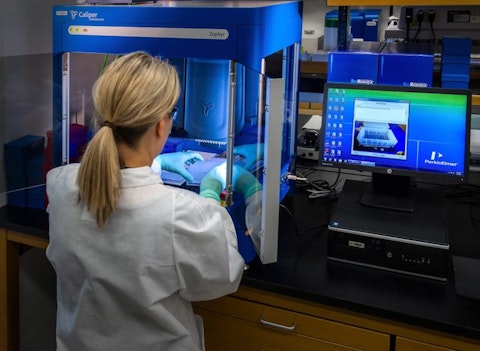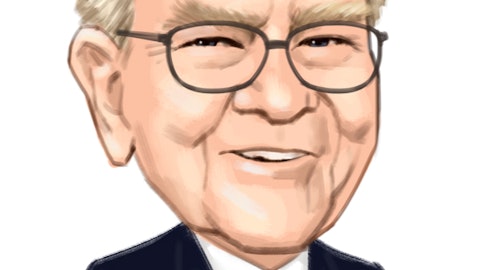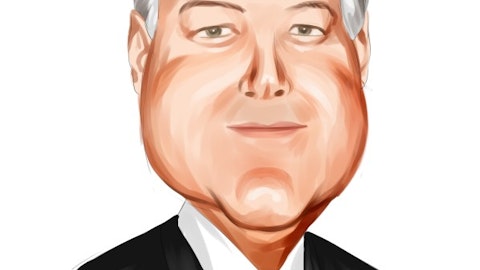In this article, we discuss the 10 best healthcare stocks to buy in 2022 according to hedge funds. If you want to skip our detailed review of these stocks and the latest market situation, go directly to 5 Best Healthcare Stocks to Buy in 2022 According to Hedge Funds.
The United States has the largest healthcare industry in the world, and in 2020 the country spent a record 19.7% of its total gross domestic product (GDP) on healthcare expenditure. The Covid pandemic exposed many flaws within the country’s healthcare system, and many emerging trends in the industry now seek to define its future trajectory. These include shifting consumer preferences as technology merges with conventional care-giving, giving rise to the whole industry of ‘tele-health’, which enables users to seek medical expertise through digital platforms. Another trend is the rise of biotech firms working on artificial intelligence technologies that research, analyze and model various diseases in order to diagnose next-gen treatments. Investments are also being made to advance robotics in the field of medical surgery, where tiny robots are now enabling surgeons to perform minimally-invasive surgeries that enhance patient outcomes.
The Russell 3000 HealthCare Index, a benchmark for the global healthcare sector, returned approximately 20% in 2021. This shows robust growth at a time when the global economy was still reeling from post-Covid instability. The global consumer healthcare market stood at roughly $3.32 trillion in 2020, and is expected to reach $6.65 trillion by 2028, growing at compound annual growth rate (CAGR) of 8.56% from 2021 to 2028. According to data provided by the US government, 1 in 5 people in the country will reach retirement age by 2030, a trend which will drastically expand the country’s need for healthcare services.
With a worldwide pandemic only a couple years behind us, and experts warning of many potential pandemics to come, investors are pouring billions into the healthcare industry in order to develop cutting-edge therapies and technologies that will change how we diagnose and treat various human conditions. Some of the biggest players in the healthcare industry include Pfizer Inc. (NYSE:PFE), Johnson & Johnson (NYSE:JNJ), and CVS Health Corporation (NYSE:CVS), and many others mentioned below.
Our Methodology
We picked 10 healthcare stocks from the database of Insider Monkey which boasted the highest number of bullish hedge fund bets, signaling each stock’s popularity in context of the overall market. We have also provided analyst ratings and business fundamentals around each company to give our readers a clearer picture for their investment choices.
Best Healthcare Stocks to Buy in 2022 According to Hedge Funds
10. Anthem, Inc. (NYSE:ANTM)
Number of Hedge Fund Holders: 69
Anthem, Inc. (NYSE:ANTM) is an Indianapolis-based firm which offers healthcare benefit plans to individual customers, small and large employers, and Medicaid and Medicare markets. At the start of 2022, it served approximately 45 million medical members through its affiliated health plans. Over the last 12 months, shares of Anthem, Inc. (NYSE:ANTM) have recorded an increase of 30.72%, and 11.98% so far in the year as of May 27.
On May 4, Mizuho analyst Ann Hynes gave Anthem, Inc. (NYSE:ANTM) a ‘Buy’ rating and a price target of $545, up from $510. Hynes believes the firm could grow its earnings in 2022 towards the high end of its long-term guidance range of 12-15%, after it posted solid Q1 results.
For the first quarter, Anthem, Inc. (NYSE:ANTM) disclosed earnings per share of $8.25, outperforming estimates by $0.42. The company’s revenue for the quarter stood at $37.9 billion, up 18.03% year-on-year and beating analysts’ forecasts by $582.7 million.
Out of the 912 elite hedge funds tracked by Insider Monkey at the end of the first quarter, 69 hedge funds were shareholders of Anthem, Inc. (NYSE:ANTM) with combined stakes worth $5.7 billion. This shows improving investor confidence in the firm over the previous quarter where 63 hedge funds reported bullish bets on the company shares. The largest shareholder of Anthem, Inc. (NYSE:ANTM) in the first quarter was Eagle Capital Management, with a stake worth $1.16 billion.
Investment firm ClearBridge Investments talked about many stocks in its Q4 2021 investor letter, and Anthem, Inc. (NYSE:ANTM) was one of them. The fund said:
“The quarter also saw strong showings from Anthem; has been operating well and is a key player in the evolution of health care insurance and delivery, providing more integrated and cost-effective solutions and receiving a tailwind from an aging population. The company tends to be volatile based on changes in medical loss ratios (MLR), though we view this volatility as a short term for business models that are able to reprice policies relatively quickly. We added significantly to the position during the year.”
Just like Pfizer Inc. (NYSE:PFE), Johnson & Johnson (NYSE:JNJ), and CVS Health Corporation (NYSE:CVS), Anthem, Inc. (NYSE:ANTM) is one of the top healthcare stocks that hedge funds are buying.
9. Bristol-Myers Squibb Company (NYSE:BMY)
Number of Hedge Fund Holders: 70
Bristol-Myers Squibb Company (NYSE:BMY) is a biopharmaceutical firm based in New York which develops and sells a range of drug therapies around the world. It is a renowned dividend stock, recording 15 consecutive years of dividend increases and a yield of 2.84% as of May 27.
Citi analyst Andrew Baum on May 26 raised the firm’s price target on Bristol-Myers Squibb Company (NYSE:BMY) to $90 from $75 and reiterated a ‘Buy’ rating on the company shares. The firm has seen its share price climb 39.35% in the last 6 months as of May 27, and 23.04% in the year so far.
In Q1 2022, Bristol-Myers Squibb Company (NYSE:BMY) reported earnings per share of $1.96, exceeding analysts’ forecasts by $0.07. Revenue for the quarter stood at $11.65 billion, beating consensus estimates by $308.4 million.
As of the end of the first quarter, 70 hedge funds held $2.43 billion worth of stakes in Bristol-Myers Squibb Company (NYSE:BMY), as opposed to $3.31 billion worth of stakes held by 66 hedge funds a quarter ago. With 4.36 million shares worth $318.4 million, Two Sigma Advisors was the most prominent shareholder of Bristol-Myers Squibb Company (NYSE:BMY) in the first quarter of 2022.
8. CVS Health Corporation (NYSE:CVS)
Number of Hedge Fund Holders: 72
CVS Health Corporation (NYSE:CVS) operates an extensive network of pharmacies and clinics across the United States, through its brands CVS Pharmacy, CVS Caremark, MinuteClinic, and Omnicare. Its share have surged 13.43% in the last 12 months as of May 27, and 6.55% over the last 6 months.
On April 7, Tigress Financial analyst Ivan Feinseth maintained a ‘Buy’ rating on CVS Health Corporation (NYSE:CVS) shares, and bumped the price target to $125 from $122. He believes the company’s ongoing evolution into a customer-centric, full-service healthcare solutions provider resulted in strong results for the quarter. The analyst holds a long-term bullish view given the firm’s primary care focus combined with an extensive retail store and services network.
On May 4, CVS Health Corporation (NYSE:CVS) reported its Q1 earnings, and disclosed a revenue of $76.8 billion for the quarter, outperforming estimates by $1.53 billion. EPS was recorded at $2.22, beating market estimates by $0.08.
72 hedge funds reported bullish bets on CVS Health Corporation (NYSE:CVS) at the end of March, as compared to 71 hedge funds in the previous quarter. The total value of Q1 hedge fund holdings stood at $1.56 billion. With a $421 million position, Harris Associates was the leading shareholder of CVS Health Corporation (NYSE:CVS) at the end of March.
Here is what ClearBridge Investments had to say about CVS Health Corporation (NYSE:CVS) in its Q4 2021 investor letter:
“Improving health remains a key impact theme for the portfolio, and over the past year or so we have increased our exposure to the health care sector, through the addition of CVS Health, which is well-positioned to help define the future of health care in terms of costs, quality and convenience.”
7. AbbVie Inc. (NYSE:ABBV)
Number of Hedge Fund Holders: 76
AbbVie Inc. (NYSE:ABBV) ranks next on the list of healthcare stocks that hedge funds are buying. The Illinois-based biopharmaceutical firm deals in the development, manufacturing and sale of medicinal therapies for a wide range of diseases. It is a consistent payer of dividends to shareholders, with 9 consecutive years of dividend increases under its belt. Its yield stands at 3.76% as of May 27.
AbbVie Inc. (NYSE:ABBV) posted earnings per share of $3.16 for the first quarter, exceeding estimates by $0.02. Quarterly revenue saw a boost of 4.66% in comparison to the same period over last year, and came in $74.9 million below consensus figures at $13.5 billion.
On May 2, Wells Fargo analyst Mohit Bansal maintained an ‘Overweight’ rating on AbbVie Inc. (NYSE:ABBV) shares, and raised the price target to $200 from $165. The analyst rated AbbVie as his top pick in the sector, and notes that right now is the time to own the company shares given it is at least 35% undervalued considering its long-term growth potential. Morgan Stanley analyst Terence Flynn also has an ‘Overweight’ rating on AbbVie Inc. (NYSE:ABBV) shares, and thinks that the recent share price weakness presents a good buying opportunity.
After a detailed study of the 900+ hedge funds in the database of Insider Monkey, 76 hedge funds were found to be shareholders of AbbVie Inc. (NYSE:ABBV) at the end of the first quarter of 2022. This is in comparison to 82 hedge funds at the close of the fourth quarter. Arrowstreet Capital, with 4.65 million shares valued at $754.2 million, was the firm’s leading shareholder at the end of the first quarter.
Here is what investment Miller Howard Investments had to say about the prospects of AbbVie Inc. (NYSE:ABBV) in its Q3 2021 investor letter:
“While optimistic about a recovery, we continue to balance our cyclical holdings with dividend-payers in stable, less economically-sensitive industries. We hold three pharmaceutical companies, (which includes) AbbVie (ABBV). All three have strong cash flows and balance sheets, making their high dividends reasonably safe. The investment controversy surrounding these pharma companies is whether they can develop or acquire new products to replace their current blockbuster drugs. The low valuations on these stocks reflects what we believe to be undue pessimism by investors on the prospects for new drugs.”
6. Pfizer Inc. (NYSE:PFE)
Number of Hedge Fund Holders: 79
Pfizer Inc. (NYSE:PFE) develops and sells a range of biopharmaceutical products around the world. It posted earnings per share of $1.62 for the first quarter, beating market estimates by $0.05. The revenue generated over the first quarter was recorded at $25.7 billion, above consensus estimates by $927.1 million and signaling a jump of 76% from the year-ago quarter.
On May 25, Pfizer Inc. (NYSE:PFE) announced that it would start selling almost two dozen of its patent-protected drugs and vaccines at discounted prices to over 45 low-income countries, including Senegal, Uganda and Ghana, among others. The company will also work with these countries’ governments to improve their healthcare infrastructure and resolve procurement obstacles. Wells Fargo analyst Mohit Bansal on May 4 kept an ‘Overweight’ rating on Pfizer Inc. (NYSE:PFE) shares and lowered the price target to $55 from $60.
As of the end of the first quarter, 79 hedge funds reported long bets on Pfizer Inc. (NYSE:PFE) shares, with an aggregate value of $4.1 billion. This is in comparison to 83 hedge funds a quarter earlier. The most prominent shareholder of the company at the close of the first quarter was AQR Capital Management, with 10.7 million shares priced at $554.1 million.
ClearBridge Investments mentioned Pfizer Inc. (NYSE:PFE) in its Q4 2021 investor letter. Here’s what the fund said:
“While the level of general turnover abated as we progressed through 2021, it remained high in one area: post-COVID-19 recovery plays. The concept behind this investment thesis was, and still is, straightforward: with the advent of effective vaccines, the path from pandemic to endemic is just a matter of time. As this transition occurs, the estimated excess savings of over $2 trillion built up on U.S. consumer balance sheets will unlock dramatic pent-up demand for experiences, especially global travel. This investment case seemed especially compelling when the Pfizer vaccine positively surprised markets in November 2020. As a result, we made post-COVID-19 stocks (which were trading well below our estimate of recovery value) a sizable theme within the portfolio. We understood this to be a more aggressive tilt in positioning because it required a major improvement in demand to catalyze fundamentals and drive price toward higher business values. While we accepted that recovery would not be smooth and that it would take time to deploy vaccines both domestically and globally, we decided that recovery was the logical path of least resistance and we were being well compensated for these risks.
What we did not account for, however, was vaccine hesitancy and the risk of further infection waves. As a result, the first variant wave, Delta, was a negative surprise to both the market and our team. When the risk surfaced, we immediately updated our probability-driven models and debated how we should react. The resulting conclusion was that the recovery would be delayed and that we should reduce our exposure quickly, subsequently targeting the most aggressive recovery stocks such as cruise lines. We again acted swiftly and decisively to the positive surprise that Pfizer had delivered a high-efficacy antiviral COVID-19 pill. This pill should greatly reduce COVID-19 severity risks globally, increasing the probability of a global travel recovery in 2022. While this is still true, the emergence of the highly mutated Omicron variant set off another infection wave which spurred us to again act quickly and further reduce our risk exposure. This back-and-forth may sound exhausting, but it highlights our compulsion to act if we determine a surprise has a large enough impact on the probabilities that power our valuation-driven investment cases.
Alongside Johnson & Johnson (NYSE:JNJ) and CVS Health Corporation (NYSE:CVS), Pfizer Inc. (NYSE:PFE) is a trending healthcare stock to buy.
Click to continue reading and see 5 Best Healthcare Stocks to Buy in 2022 According to Hedge Funds.






